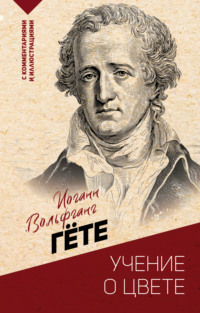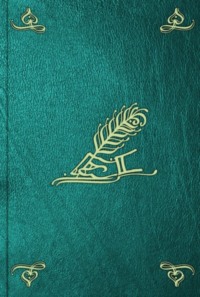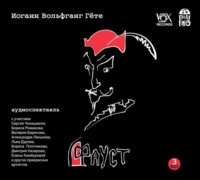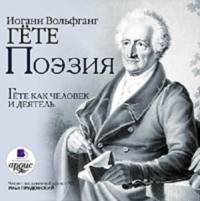 полная версия
полная версияThe Autobiography of Goethe
Departure for Weimar.
Much as my understanding and my feeling inclined me to this side, there was still no lack of weighty arguments in favour of my new route. My father had laid out for me a fine plan of travel, and had given me a little library, which might prepare me for the scenes I was to visit, and also guide me on the spot. In my leisure hours I had had no other entertainment than to reflect on it, and, indeed, during my last short journey I had thought of nothing else in the coach. Those glorious objects which, from my youth up, I had become acquainted with, histories and all sorts of tales, gathered before my soul, and nothing seemed to me so desirable as to visit them, while I was parting from Lili for ever.
As these thoughts passed through my mind I had dressed myself and was walking up and down my chamber. My anxious hostess entered. "What am I to hope?" she cried. "Dearest madam," I answered;" say no more on the subject; I have made up my mind to return: the grounds of that conclusion I have well weighed, and to repeat them to you would be wasting time. A resolution must be taken sooner or later, and who should take it but the person whom it most concerns?"
I was moved, and so was she; and we had an excited scene, which I cut short by ordering my servant to engage a post-coach. In vain I begged my hostess to calm herself, and to turn the mock-departure which I took of the company the evening before into a real one; to consider that it was only a temporary visit, a postponement for a short time; that my Italian journey was not given up, and my return that way was not precluded. She would listen to nothing, and she disquieted her friend, already deeply excited, still more. The coach was at the door; everything was packed, and the postilion gave the usual signs of impatience; I tore myself away; she would not let me go, and with so much art brought up all the arguments of the present, that finally, impassioned and inspired, I shouted out the words of Egmont:
"Child! child! no more! The coursers of time, lashed, as it were, by invisible spirits, hurry on the light car of our destiny, and all that we can do is in cool self-possession to hold the reins with a firm hand, and to guide the wheels, now to the left, now to the right, avoiding a stone here, or a precipice there. Whither it is hurrying who can tell? and who, indeed, can remember the point from which it started?"
END OF THE AUTOBIOGRAPHY1
A chief judge or magistrate of the town.
2
An old silver coin.
3
A pun upon the name of Ochsenstein. —Trans.
4
The Messiah is written in hexameter verse. —Trans.
5
The obsolete word "gossip" has been revived as an equivalent for the German "Gevatter." But it should be observed that this word not only signifies godfather, but that the person whose child has another person for godfather (or godmother) is that person's Gevatter, or Gevatterin (feminine).
6
A German proverb, "Heute roth, morgen todt."
7
The names of the sharp notes in German terminate in "is," and hence "f" and "g" sharp are called "fis" and "gis."
8
These are the technical names for classes of accents in the Hebrew grammar. —Trans.
9
It should be observed that in this Biblical narrative, when we have used the expressions "Deity," "Godhead," or "Divinity," Goethe generally has "die Götter," or "the Gods." —Trans,
10
Every kingdom divided against itself shall be brought to desolation; for the princes thereof have become the associates of robbers. —Trans.
11
Racine's tragedy. —Trans.
12
Eyes, not hands. —Trans.
13
That is to say, he was a Calvinist, as distinguished from a Lutheran. —Trans.
14
The diminutive of Margaret. —Trans.
15
That is to say, a poem written for a certain occasion, as a wedding, funeral, &c. The German word is "Gelegenheitsgedicht." —Trans.
16
The "new Abelard" is St. Preux, in the Nouvelle Heloise of Rosseau. —Trans.
17
A class of attendants dressed in Hungarian costume. —Trans.
18
A sort of buffoon.
19
This word, which signifies something like our "bully," is specially used to designate a fighting student. —Trans.
20
Literally: "to strike two flies with one flapper." —Trans.
21
The river on which Halle is built. —Trans.
22
The river that flows by Leipzig. —Trans.
23
Leipzig was so called, because a large and influential portion of its citizens were sprung from a colony of Huguenots, who settled there after the revocation of the edict of Nantes. – American Note.
24
That is to say, the influence of Gottsched on German literature, of which more is said in the next book. —Trans.
25
"Die Laune des Verliebten," translated as The Lover's Caprice, see p. 241
26
: "Exposition," in a dramatic sense, properly means a statement of the events which take place before the action of the play commences. —Trans.]
27
The real meaning of the passage is that the idiom "Possen reissen," used also with the university word "Suite," so that one can say "Suiten reissen." —Trans.
28
The lecture-room. The word is also used in university language to denote a professor's audience.
29
The humour of the above consists, not in the thoughts, but in the particular words employed. These have no remarkable effect in English, as to us the words of Latin origin are often as familiar as those which have Teutonic roots, and these form the chief peculiarity of the style. We have therefore given the poem in the original language, with the peculiar words (as indicated by Goethe) in italics, and subjoin a literal translation. It will be observed that we have said that the peculiarity consists chiefly, not solely, in the use of the foreign words, for there are two or three instances of unquestionably German words, which are italicised on account of their high-sounding pomp.
"Oh Hendel, whose fame extends from south to north, hear the Pæan which ascends to thine ears. Thou bakest that which Gauls and Britons industriously seek, (thou bakest) with creative genius original cakes. The ocean of coffee which pours itself out before thee, is sweeter than the juice which flows from Hymettus. Thy house, a monument, how we reward the arts, hung round with trophies, tells the nations: 'Even without a diadem, Hendel formed his fortune here, and robbed the Cothurnus of many an eight-groschen-piece.' When thine urn shines hereafter in majestic pomp, then will the patriot weep at thy catacomb. But live! let thy bed (torus) be the nest of a noble brood, stand high as Olympus, and firm as Parnassus. May no phalanx of Greece with Roman ballistæ be able to destroy Germania and Hendel. Thy weal is our pride, thy suffering our pain, and Hendel's temple is the heart of the sons of the Muses." —Trans.
30
"Bildende und Redende Kunst." The expression "speaking art " is used to produce a corresponding antithesis, though "belles lettres" would be the ordinary rendering. —Trans.
31
"Pratische Philosophen, bewusstlose Weltweisen." It is impossible to give two substantives, as in the original, since this is effected by using first the word of Greek, then the word of German origin, whereas we have but one. —Trans.
32
Winckelmann was assassinated —Trans.
33
"Das Werden," the state of becoming, as distinguished from that of being. The word, which is most useful to the Germans, can never be rendered properly in English. —Trans.
34
If we could make use of some such verbs as "inself" and "unself," we should more accurately render this passage. —Trans..
35
A Repetent is one of a class of persons to be found in the German universities, and who assist students in their studies. They are somewhat analogous to the English Tutors, but not precisely; for the latter render their aid before the recitation, while the Repetent repeats with the student, in private, the lectures he has previously heard from the professor. Hence his name, which might be rendered Repeater, had we any corresponding class of men in England or America, which would justify an English word. – American Note.
36
A "murki" is defined as an old species of short composition for the harpsichord, with a lively murmuring accompaniment in the bass. —Trans.
37
The German word is "Koth," and the whole object of the line is to introduce a play on the words "Göthe," "Götter," "Gothen," and "Koth." —Trans.
38
That is, towards Germany, Germany is the Land by pre-eminence. —American Note.
39
Abbreviation for Frederica. —Trans.
40
The exclamation used on striking a bargain. It is, we believe, employed by some trades in England. —Trans.
41
The general custom of the country villages in Protestant Germany on such interesting occasions. —American Note.
42
In the original his answer is "Guet," fur "Gut." —Trans.
43
Diminutive of Barbara. —Trans.
44
This is introduced in Wilhelm Meister's Wanderjahre.—Trans.
45
A polemic dissertation written on taking an university degree. —Trans.
46
Medicine. —Trans.
47
"Michel" is exactly to the Germans what "John Bull" is to the English. —Trans.
48
"Um den so genannten Pfaffen zu schaden." As we have not the word for a priest, which exactly expresses the contempt involved in "Pfaffe," the word "priestcraft" has been introduced. —Trans.
49
"Practically clever" is put as a kind of equivalent for the difficult word "geistreich." —Trans.
50
This English word is used in the original. —Trans.
51
A complete edition of Lenz's works was published by Tieck in 1828. In that will be found the essay and play in question, to the last of which he gives the name Amor vincit omnta.—Trans.
52
The lines in Shakspeare, which the above are intended to imitate, are the following: —
"The praiseful princess pierc'd and prick'd a pretty pleasing pricket;Some say a sore; but not a sore till now made sore with shooting.The dogs did yell; put L to sore, then sorel jumps from thicketOr pricket, sore, or else sorel; the people fall a-hooting.If sore be sore, then L to sore makes fifty sores, O sore L!Of one sore I an hundred make, by adding but one more L."Lenz's words, which cannot be rendered intelligibly into English, furnish an instance of Goethe's meaning, when he commends Lenz as happily catching the spirit of the original, without the slightest pretence to accuracy. – Trans.
53
The above doggrel is pretty faithful, but it is as well to give the original.
"Ein Ritter wohnt in diesem Haus;Ein Meister auch daneben;Macht man davon einen BlumenstraussSo wird's einen Rittmeister geben.Ist er nun Meister von dem RittFührt er mit Recht den Namen;Doch nimmt der Ritt den Meister mit,Weh ihm und seinem Samen."– Trans.54
By this daughter he means "Ottilie" in the Elective Affinities.. —Trans.
55
Annual publications devoted to poetry only. —Trans.
56
The fight of Hermann, the "Arminius" of Tacitus, against the Romans. —Trans.
57
Persons betrothed are in German called "bride" and "bridegroom." —Trans.
58
A "stammbuch" is a sort of album for autographs and short contributions. —Trans.
59
The post, managed by the princes of Thurn and Taxis, in different parts of Germany. An ancestor of this house first directed the post system in Tyrol, in 1450, and Alexander Ferdinand von Thurn received, in 1744, the office of Imperial Postmaster-General, as a fief of the empire. —Trans.
60
"Die lustige person." That is to say, the permanent buffoon, like "Kasperle" in the German puppet-shows, or "Sganarelle" in Moliere's broad comedies. —Trans.
61
The peasant war, answering to the Jaquerie in France. —Trans.
62
Anglicé: Make hay when the sun shines. —Trans.
63
It is a German peculiarity to apply the word "Schwager" (brother-in-law) to a position. —Trans.
64
"Halbheit," "Halfness" – if there were such a word – would be the proper expression. —Trans.
65
"Nathan the wise," in Lessing's play, founded on Boccacio's tale of the rings. —Trans.
66
That is to say, a native of one of the Imperial cities.
67
The title of the poem is "Der untreue Knabe," (The Faithless Boy), and in the first line of it, as published in Göthe's collected works, "Knabe" will be found instead of "Bube" – Trans.
68
There are two words used for "skate." One of them Schlittschuh, means "sledge-shoe;" the other Schrittschuch, means "stride-shoe." Göthe and his friends make use of the former; Klopstock contends for the latter.
69
The allusion, is to Göthe's own poem "Der Zauberlehrling."
70
Members of the same family address each other with the second person singular, "Du" instead of the more formal third person plural, "Sie." In the same way the French employ "Tu" instead of "Vous." Trans.
71
The following note is prefixed by the author to the last portion of this work.
Preface. In treating a life's story, progressing in many different ways, like this which we have ventured to undertake, it is necessary, in order to be intelligible and readable, that some parts of it, connected in time should be separated, whilst others which can only be understood by a connected treatment must be brought together: and the whole be so arranged in sections that the reader inspecting it intelligently may form an opinion on it, and appropriate a good deal for his own use.
We open the present volume with this reflexion, that it may help to justify our mode of proceeding: and we add the request that our readers will note that the narrative here continued does not exactly fit on to the end of the preceding book, though the intention is to gather up again the main threads one by one, and to bring on the personages as well as the thoughts and actions in a virtually complete sequence.
72
A coin, with the head of the sovereign stamped upon it, generally worth 4 1/2 good groschen. —Trans.
73
The "von" which in Germany those who are ennobled prefix to their surnames.
74
Hanswurst is the old German buffoon, whose name answers to the English "Jack Pudding." —Trans.









